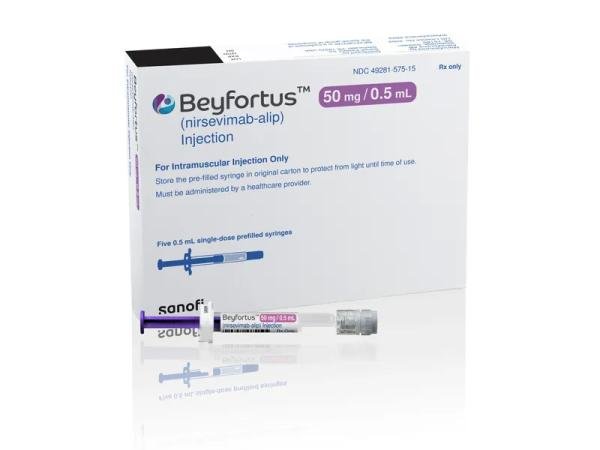Beyfortus (cvx 306)
Generic name: nirsevimab (cvx 306) [ nir-SEV-i-mab ]
Drug class: Antiviral monoclonal antibodies
What is nirsevimab?
Nirsevimab is a man-made antibody that helps protect the body against respiratory syncytial virus (RSV) infection for up to 5 months.
Nirsevimab is used to prevent lung disease caused by respiratory syncytial virus in newborn baby and children up to 24 months old.
Nirsevimab may also be used for purposes not listed in this medication guide.
Nirsevimab side effects
Get emergency medical help if you have signs of an allergic reaction: hives, difficult breathing, swelling of the face, lips, tongue, or throat.
Call the doctor at once if your child has:
-
muscle weakness;
-
trouble swallowing;
-
blue lips or fingernails; or
-
bluish color of skin.
Common side effects of Beyfortus may include:
-
hard painful lump (induration) around where the medicine was injected; or
-
rash, or swelling where the injection was given.
This is not a complete list of side effects and others may occur. Call your child's doctor for medical advice about side effects. You may report side effects to FDA at 1 800 FDA 1088.
Related/similar drugs
Warnings
Nirsevimab should not be given to a child who has had a severe allergic reaction to it.
Your child should not receive a medicine called palivizumab if the child already received nirsevimab in the same respiratory syncytial virus (RSV) season.
Before taking this medicine
Your child should not receive nirsevimab if the child has ever had a life-threatening allergic reaction to any component of this medicine or to antibodies called immunoglobulins.
Your child should not receive a medicine called palivizumab if the child already received nirsevimab in the same RSV season.
Tell your child's doctor if the child has bleeding or bruising problems.
How is nirsevimab given?
Nirsevimab is given once as an injection (shot) into the leg muscle. A healthcare provider will give this injection.
If your child remains at increased risk for getting RSV infection or has heart surgery, your child may receive another dose of this medicine.
What happens if I miss a dose?
Since nirsevimab is given as a one time injection, your child is not likely to be on a dosing schedule.
What happens if I overdose?
An overdose of nirsevimab is unlikely to occur.
What should I avoid while receiving nirsevimab?
Follow the doctor's instructions about any restrictions on food, beverages, or activity.
What other drugs will affect nirsevimab?
Other drugs may affect nirsevimab, including prescription and over-the-counter medicines, vitamins, and herbal products. Tell the doctor about all other medicines your child uses.
Biological Products Related to Beyfortus
Find detailed information on biosimilars for this medication.
Popular FAQ
What are the symptoms of RSV(respiratory syncytial virus)
RSV symptoms are runny nose, sore throat, stuffy nose, cough wheezing, headache, and fever for adults and RSV symptoms in the young include decreased activity, irritability, and breathing difficulties.
Continue readingMore about Beyfortus (nirsevimab)
- Check interactions
- Compare alternatives
- Drug images
- Side effects
- Dosage information
- During pregnancy
- FDA approval history
- Drug class: antiviral monoclonal antibodies
- En español
Patient resources
Professional resources
Related treatment guides
Further information
- Your child's doctor or pharmacist can provide more information about nirsevimab.
Remember, keep this and all other medicines out of the reach of children, never share your medicines with others, and use this medication only for the indication prescribed.
Always consult your healthcare provider to ensure the information displayed on this page applies to your personal circumstances.
Copyright 1996-2025 Cerner Multum, Inc. Version: 1.01.

